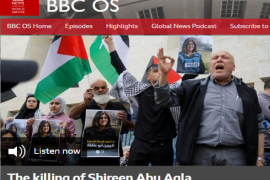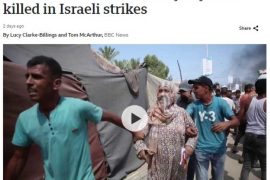Listeners to one of the October 7th editions of the BBC World Service radio programme ‘Newsday’ heard a flimsy item about a non-event of a story based on an inadequately identified source, with comment from an inadequately presented contributor. 
Presenter Bolo Mosuro introduced that item (from 10:01 here) as follows:
[emphasis in italics in the original, emphasis in bold added]
Mosuro: “Now, we head to the Gaza Strip where the past few months have seen a further deterioration in the state of Palestinians in the area. The blockade by Israel has meant a lack of clean drinking water, the electricity supply is intermittent, unemployment is high and even sick patients have to apply for exit permits before being allowed to leave the territory for medical treatment.”
Mosuro failed to clarify that Egypt has also placed restrictions on the Gaza Strip since it came under the control of a terrorist organisation in 2007.
Her claim that Israel’s counter-terrorism measures are the cause of “a lack of clean drinking water”, inadequate power supplies and unemployment are of course as inaccurate as they are unsurprising, given that the BBC has repeatedly promoted misinformation concerning water and power in the past. As documented here previously, in May of this year Hamas disabled Gaza City’s desalination plant, cutting some 250,000 residents off from their water supply. The long-running electricity shortage is the product of disputes between Hamas and the Palestinian Authority and has nothing to do with “the blockade”.
The context essential for understanding why residents of an enclave run by a terrorist organisation should need permits to enter Israel for medical treatment (or other reasons) was absent from that part of Mosuro’s introduction.
Since May the BBC has promoted the partisan narrative that Operation Guardian of the Walls began because of a property dispute in a Jerusalem neighbourhood and “clashes” at a holy site in the city. Mosuro however claimed that it was counter terrorism measures she chose to inaccurately depict as “marginalisation” that sparked the conflict rather than a terrorist organisation firing missiles at the capital city of a sovereign state.
Mosuro: “Well it’s such marginalisation that led to tensions earlier in the year that spilled over into violence between Israel and the Hamas group which governs the territory. Well Hamas as a whole, or in some cases its military wing, is designated as a terrorist group by Israel, the United States, European Union and UK as well as other countries.”
Listeners then discovered that the item to which they were listening is based on information from an unidentified “source close to Hamas” and Mosuro introduced her sole interviewee without providing any information about the media organisation he works for or his level of expertise on the topic of the item.
Mosuro: “But now help for Gaza may be at hand. A source close to Hamas has told the BBC that an agreement has been reached between the government…between the movement and Egypt in order to enable reconstruction. Well on the line now is journalist Mourad Kamel who joined us earlier in the week from Paris and joins us again this morning. […] So…so what exactly do we know…ehm…that may have been agreed in terms of reconstruction because Hamas has been negotiating with Egypt and Israel – haven’t they? – in order to try to secure this peace deal.”
Hamas is of course not negotiating with Israel directly and is not trying to secure a “peace deal” at all.
Kamal claimed that “progress was made” in the latest round of talks in Cairo but did not provide any details as to what that supposed “progress” actually means.
Kamel: “[…] Yes you’ve summed it up pretty well. So there is a confirmation by Hamas leaders that there was progress made in negotiations with Egypt. Ah…Hamas…high level Hamas delegation arrived in Cairo as of Sunday night including its leader Ismail Haniyeh. Talks were held between the movement and Egyptian officials regarding a ceasefire with Israel but also the reconstruction of Gaza as war raged, as you said, last May between Hamas and Israel. Ahm…this is not really a surprise because there have been recent negotiations between both parties – between the Egyptian General Intelligence Services known as the Mukhabarat and Hamas – for the past couple of months.”
Mosuro: “When we’re talking about reconstruction though, one can imagine that Egypt wouldn’t just be given free rein by Israel so are there conditions attached?”
Kamal next promoted the notion to BBC audiences worldwide that jihadists “need to be contained” by funding other religiously motivated extremists.
Kamel: “Ahm…let’s put it this way: it’s very clear that Egypt is acting as a mediator here and is regaining its regional might by having such an important role in this conflict. And if Egypt is discussing with Israel [sic], it is obviously with Israeli approval. And I was speaking to an expert on the topic back in May and he told me that if a state like Qatar, for example, funds Hamas it is obviously with Israeli approval because Jihadists need…need to be contained by sustaining the administration of Hamas which is…which has been in control of Gaza since 2007.”
Mosuro: “The reason why I asked about conditionality is because I’ve read in places that Israel will only agree to full reconstruction of Gaza if there’s like a prisoner swap for instance.”
BBC audiences have been serially denied information concerning the Israelis held by Hamas in the Gaza Strip and hence would be unlikely to understand that Mosuro’s brief reference to a “prisoner swap” erroneously equates two mentally ill civilians held hostage and the bodies of two soldiers killed seven years ago with incarcerated terrorists.
Kamel: “Eh…this is true but the details of the deal itself were – or of the negotiations itself – have not been…ehm…publicised yet. So that’s not something I can confirm.”
Mosuro: “So what…OK I understand but thank you Mourad. Obviously one would wish we could ask even more to find out what kind of reconstruction would be planned but for now thank you very much for joining us this morning from France and that’s Mourad Kamel, a journalist in Paris.”
Although the “agreement” and “progress” touted in this superficial and uninformative item have yet to materialise into anything more than rumours in regional media outlets, Bola Mosuro and BBC World Service radio did not pass up the opportunity to use this non-story to once more amplify inaccurate claims about the counter terrorism measures imposed on the Gaza Strip.
Related Articles:
THE BBC’S MONOCHROME FRAMING OF GAZA’S CHRONIC UTILITIES CRISIS
REVIEWING BBC EXPLANATIONS OF POWER SHORTAGES IN THE GAZA STRIP
THE TWO NAMES BBC AUDIENCES HAVE NEVER HEARD





